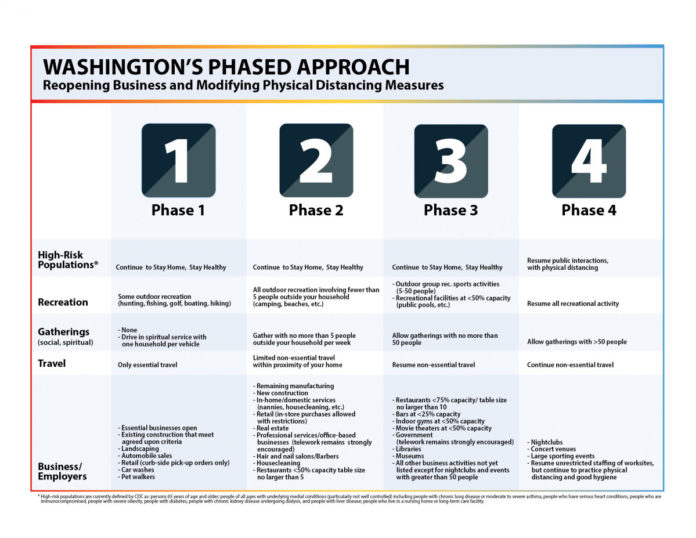Bill Beadie, principal industrial hygienist, and Abbi Russell, senior communications and outreach specialist, both with Vancouver environmental engineering firm Maul Foster and Alongi, spoke to Greater Vancouver Chamber of Commerce members and area business owners during the chamber’s latest installment of Mind What Matters, a series of webinars focused on issues key to Southwest Washington companies.

Thursday’s webinar, “The Return: Reopening Workplaces,” centered on practical resources, information and guidance companies should consider as they formulate their reopening and continued operation plans under Gov. Jay Inslee’s phased Safe Start plan, which went on pause today for two weeks due to increasing cases. The governor is also mandating that businesses refuse to serve anyone who is not in a face covering beginning next Tuesday.
Clark County is in Phase 2 of the Safe Start plan and applied for Phase 3 a week ago. With the continued uptick in cases across the county and Washington state – including a one-day all-time high in new reported coronavirus cases in Clark County – it is unclear when the county will enter Phase 3.
Nevertheless, businesses need to have a clear plan for managing the risk of transmission of the novel coronavirus in their workplaces.
At the beginning of the webinar, Russell conducted a poll wherein 67% of webinar attendees attested to having a written Covid plan, and 71% of attendees said they need help “understanding practical ways to implement the rules and guidance” for businesses operating in the county.
Beadie pointed out the high mortality rate of COVID-19, which is 4.8% of positive cases and that the number of cases today in the U.S is similar to its peak in April. But hospitalization numbers continue to remain flat overall.
“Plan on assuming that pretty much everybody is a carrier,” said Beadie, “and focus on minimizing transmission between people.”
Beadie said every plan’s bedrock should be an assessment of the risks particular to the business itself.
“Think clearly and systematically about your organization,” he said. “Think the risk of transmission through and ways to minimize that risk.
Beadie and Russell also stressed the importance of a crisis communications plan, an internal document that “needs to address every element of your response,” said Russell. All communications plans need to establish “leadership and trust,” she said, and communications should be consistent and relatable to staff, customers and all stakeholders.
Other reopening considerations include potential infrastructure weaknesses such as a building’s HVAC system and the facility’s layout. Safe work habits such as handwashing, symptom monitoring and cleaning protocols will directly impact transmission and should be clear in any reopening plan. Beadie mentioned one consultant who recommended task- and area-specific QR codes that gave employees immediate access to necessary protocols and information.
Beadie stressed the potentially profound powers of liberal sick leave policies. One food production company he referenced had an abnormally low level of Covid transmission in a high risk environment, and it turned out the key was sending people home when they were sick, paying them, and not docking their sick days.
“It was a business decision that it was going to potentially pay big dividends for them, rather than paying the costs that could be associated with a larger outbreak,” said Beadie. “Be thoughtful about employment and sick leave policies.”
He said businesses should plan on having a case of covid in their workplace and have written protocols for responses like quarantining, contact tracing and office decontamination.
Beadie said, “We are in the midst of a very dynamic period now.” He reminded attendees to “expect disruptions. The bumpier you expect it to be, the smoother it is going to be.”
Beadie said various sources offer different solutions, guidance and templates to businesses in the midst of reopening, and that in general, companies may “benefit from zooming out before you get into the weeds. Think broadly about what you are trying to accomplish.”
He recommended reading the Washington state proclamations that apply to one’s industry and visiting the Department of Labor and Industries website for more guidance on specific sectors. He said the Department of Health and the Centers for Disease Control and Prevention offer clear and current information for businesses developing a Covid plan. Beadie recommended turning to OSHA (Occupational Safety and Health Administration) for help with risk/hazard assessment. Locally, the GCVV and Clark County Public Health offer a wide variety of resources for businesses including customizable signage, the latest data and announcements, and where to find PPE and other needs. He also referred business owners to AIHA, the association for occupational health and safety science professionals for recommendations curated by industry.
Above all, Beadie and Russell emphasized the safety of employees, customers, vendors and anyone associated with a business.
“This is about people,” said Beadie. “It’s not about paperwork.”







